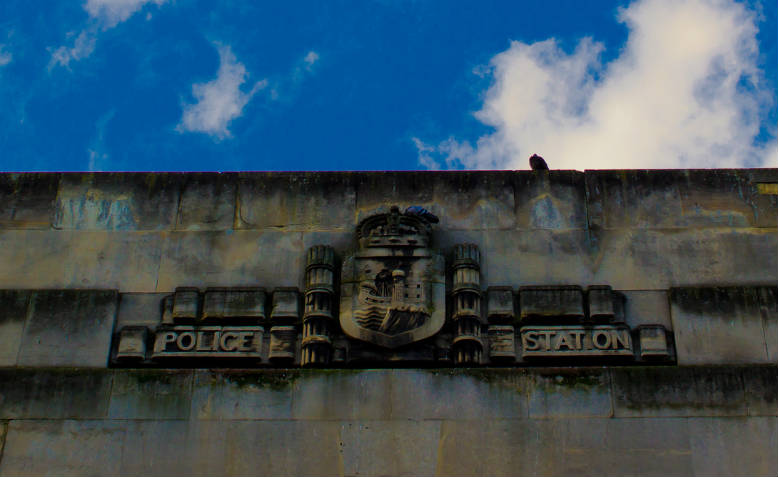 Bristol Central Police Station. Photo: Flickr/Ubaían
Bristol Central Police Station. Photo: Flickr/Ubaían
The actions of the authorities showed not only gross neglect, discrimination and injustice but in fact exacerbated hostility towards Ebrahimi, writes Naz Massoumi
A damning report by the Safer Bristol Partnership into the murder of disabled Iranian refugee Bijan Ebrahimi found both the Avon and Somerset Police and Bristol City Council as ‘institutionally racist’. This was a term first introduced in the Macpherson Report to explain police failures following the racist murder of the teenager Stephen Lawrence in 1993, but it is the first time the term has been designated to a local council.
On 14 July 2013, Bijan Ebrahimi was beaten to death, his body doused in white spirit and set on fire outside his home in Brislington. In November that year, Lee James was convicted for his murder and Stephen Norley for assisting him in the crime. Last year, two police officers were jailed and dismissed from the force for their criminal failures in dealing with Bijan.
Over the course of 7 years, Ebrahimi received a sustained campaign of victimization from neighbours and made 85 calls for assistance from the police as a victim of crime. Almost half of those calls were ignored by the police. The allegations that were recorded included assault, threats to kill, harassment, criminal damage and cruelty to his pet cat. Bijan always maintained that racial motivations were underlying this persecution. Disgracefully, only one abuser was ever reprimanded (receiving a caution) in relation to any of the crimes.
If this wasn’t bad enough, according to the report, the police repeatedly ‘sided with the abusers’ treating Bijan himself (and not his neighbours) as the criminal, including at one point issuing an antisocial behaviour order against him. In fact, three nights before the murder took place, police arrested Bijan after he had called them to report another confrontation with Lee James.
All this, the report says, ‘served as official confirmation of his perceived status as the primary perpetrator rather than the primary victim’. This is particularly troubling given that in their campaign against him the attackers wrongly accused Bijan of being a paedophile. Consequently, the actions of the authorities actually exacerbated the cloud of suspicion and hostility towards Ebrahimi, feeding further misconceptions about him to others. As such his treatment was not only one of gross neglect, discrimination and injustice, but potentially one of culpability too – as it only served to encourage his victimisation.
There remain unanswered questions about what bearing Bijan’s disability had on his discriminatory treatment. To what extent did his condition influence the authorities’ perceptions of his grievances and therefore the way they dealt with him? The report states it found no evidence that his disability played a part in his victimisation but as Katherine Quarmby has argued there is a familiar pattern of disabled people being falsely accused as sex criminals and subjected to violent attacks. Combine this with the racist stereotypes of minorities as sexual predators and anti-immigrant racism, and you get some idea of the cocktail of prejudice Bijan encountered.
Bijan’s murder, and the institutional failures that led to it, are a stark reminder of the dangerous culture of discrimination immigrants and refugees face in Britain today, following a long pattern of degrading treatment ranging from detention centres and deportation to political scapegoating and stigmatisation in the press. Only months after Bijan’s death, Theresa May, as Home Secretary, introduced her flagship immigration bill – a raft of regressive measures with the aim of making Britain a ‘hostile environment’ for immigrants. This included vans driving around the country with adverts telling immigrants to ‘go home’. Such hostile policies have now infiltrated into our universities where as lecturers we are required to monitor international students as though we are UK Border Agency staff.
But it is also a reminder of how, twenty years on from the start of the Macpherson inquiry, racism is still very much ingrained in the police force. In fact, as Channel 4 News reported yesterday, a Freedom of Information release from March showed in the three years that followed Bijan’s murder Avon and Somerset police received 101 number of complaints of racism from the public but not a single officer was disciplined. In January this year, 63-year old Judah Adunbi, a race relations advisor, was tasered in the face by a police officer sparking local protests and a community campaign that have eventually led to the officer being charged.
The report’s conclusion of ‘institutional racism’ is therefore a welcome step forward. Mayor Marvin Rees has apologised for the failings of the council and the police, accepted all the findings of the report and promised to address the problems. He now needs to ensure the institutions responsible be held to account.
Because what happened to Bijan Ebrahimi must never happen again.

